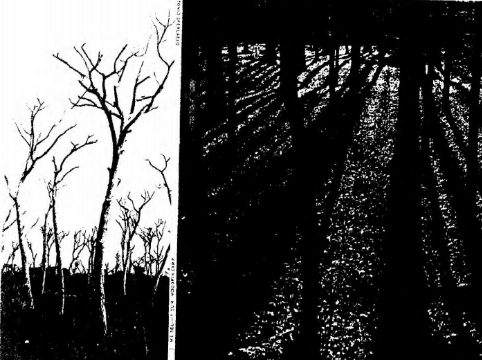One of the major causes of the eclipse of Pagan Rome is acknowledged to be the mismanagement of the extensive grain-growing areas of North Africa. An area which was once immensely fertile is now a waste of desert sand and barren, rocky hillsides, with only the ruins of once famous cities such as Carthage. Thus God ordered the course of the history of the world to suit His own designs, making use of man’s greed in overworking the land. This work of God was, we believe, foreshadowed in the 3rd seal vision of the Apocalypse (ch.6). There is good Scriptural evidence, set out in “The Revelation of Jesus Christ” Ch.7 (Part 4 first edition) to show that this seal symbolises a judgment which would fall on the Roman Empire from the southern quarter, its effect gradually spreading northwards.
What incentives there must have been for the farmers of those days to produce ever more grain to feed the Empire, to use every available square foot of land: Those living in the wheatlands would hardly have realised the widespread effects that would ensue as they cut down trees and worked the soil so hard that its structure was destroyed.
Once again the above example is only one of many in history) ecologists are very concerned with tell-tale signs of another coming catastrophe of this nature, only on a much larger scale than ever before. It was imagined that with new “scientific” knowledge and modern technology, production levels could be raised to meet the rapacity of the world’s growing population. So the old approach to soil management which respects the myriad of interlocking processes of nature has been abandoned. But now, suddenly, from the famine-stricken belts of central Africa to the dying forests of Europe and the Amazon, some of the consequences of the technological revolution have been appearing all over the world.

Withering glades on the coast of Tuscany. White crosses mark dying trees in a West German forest
A new book, “Far from Paradise: the Story of Man’s Impact on the Environment“, weaves together all the half-familiar strands in the story of coming disaster. It seems entirely fitting that, in the last days, when Jesus is to come and have dominion over the earth, that man should demonstrate how incapable he is of managing the earth himself. It is essential that man, full of pride in his technical ‘achievements, must be brought low, so that he will have to come with bended knee to the Saviour of the world. Just as Israel and all peoples found relief from famine and starvation at the intervention of Joseph, so, I believe, it will be in similar distressing circumstances that Israel and the nations will find succour in Jesus in these days.
The present portents in the world’s ecology are already making headlines in the media. They are not now confined to one part of the earth’s surface, but are worldwide. God’s wrath is aroused when men destroy the earth (Rev.11:18). That God should be angry is understandable. The earth with all its beauty and fertility is His creation. He set man to till it and keep it; yet man destroys it with his inventions. God will have just cause to destroy those who destroy the earth when the kingdoms of the world are become the Kingdom of our Lord and of His Christ. Then the man of God’s choice, Christ, the Son of David, will have dominion over the earth and its inhabitants, to the end that he will present them as a wonderful creation to its Creator. This is the prospect that faces those who love the Creator and His created works, who are not solely concerned with their advancement in life now, but are involved in the care and tending of all God’s creation.
Written On The Heart
Familiarity with Scripture comes with many years of reading, citing from memory in lectures, and the deliberate committal to memory of various portions. The ability to memorise for modern Bible students has been eroded by the lack of necessity. Intensive knowledge of God’s Word, possessed by many Bible students in the ages before printing technology, transcends in value the wide, diffuse reading on a general scale practised by the bulk of Bible readers today. But there are people even now in the world who have to hold vast treasures of secular information word-perfect in their minds generation after generation. The feat is not impossible.
The Waldensians of the 13th Century were a community who were, by and large, illiterate, but who were able to learn great tracts of the Bible and other religious documents. This fact was instrumental in their separation from the orthodox church, and in their eventual persecution. We seem nowadays to have lost sight of the value of this system, with our modern facilities. It may be a good thing were we to exercise our memories by learning a small portion regularly. “Thy word have I hid in mine heart”, said David. It must he worthwhile in itself to follow his example; but also it is possible that there may come a time when the written copies of the Word are difficult to obtain. Where would we be, as a community, in such a time of testing?
